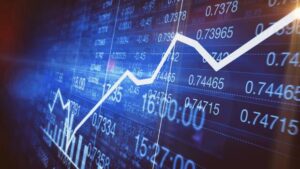
Stock indices of the largest countries in the Asia-Pacific Region (APR) are down in trading on Friday, following the U.S. stock market.
The pressure on stock markets is being put by renewed fears over further interest rate hikes amid a resilient U.S. economy, which was indicated by fresh statistical data, and hawkish comments from U.S. Federal Reserve (Fed) management.
Federal Reserve Bank of Cleveland (FRB) President Loretta Mester said she thought it was premature to conclude that US inflation was on a steady path toward the US central bank’s 2% target.
Although inflation has slowed somewhat since last summer, it is still too high, Mester said during an event at the University of South Florida on Thursday. Last week’s January Consumer Price Report showed that core inflation is slowing little, she said.
St. Louis Fed Chairman James Ballard said during a speech in Tennessee that he called for a sharper rate hike at the last Fed meeting and did not rule out a sweeping move further down the road.
Japan’s Nikkei 225 Index was down 0.7 percent by 7:13 a.m.
Shares of Internet company Rakuten Group Inc. (-5.5%), Recruit Holdings Co. Ltd., which owns job search sites, (-3.9%) and industrial equipment manufacturer Keyence Corp. (-2.6%).
In addition, investment technology stocks of SoftBank Group (-2.1%), consumer electronics maker Sony (-2.3%) and Asia’s largest clothing retailer Fast Retailing (-0.7%) were getting cheaper.
China’s Shanghai Composite Index was down 0.1% by 7:23 a.m. Hong Kong’s Hang Seng lost 0.7%.
Shares of computer maker Lenovo Group Ltd. were down the most on the Hong Kong Stock Exchange. – by 4 percent, jewelry company Chow Tai Fook Jewellery Group Ltd. – by 3.8 percent and Internet company Baidu Inc. – Ltd. by 2.8 percent.
Shares of Internet giant Alibaba dropped 1.4 percent and consumer electronics maker Xiaomi Corp. – 2.4% and Internet company Meituan – 2.6%.
South Korea’s Kospi was down 0.9% by 7:23 a.m.
One of the world’s biggest chip and electronics maker Samsung Electronics Co. was down 1.7%, automaker Hyundai Motor down 0.5%.
The Australian S&P/ASX 200 index fell 0.86% in trading.
The capitalization of the world’s largest mining companies BHP and Rio Tinto decreased by 0.25% and increased by 0.5% respectively.
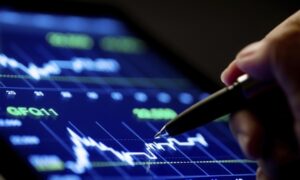
Stock indices of the largest Asia-Pacific countries are mainly gaining on Friday following the U.S. stock market dynamics.
The stock exchanges in Mainland China continue to remain closed on the Spring Festival (the beginning of the new year according to the lunar calendar).
The growth of optimism in Asian markets was also supported by the U.S. statistics published the day before, which showed that the economy remains flexible, despite a significant tightening of monetary policy by the Federal Reserve (FRS).
According to preliminary data from the U.S. Commerce Department, the country’s GDP rose 2.9% year-over-year in the fourth quarter after climbing 3.2% in the previous quarter. The consensus forecast by analysts, cited by Trading Economics, suggested economic growth had weakened to 2.6%.
The Nikkei 225 Index was up 0.05% by 7:09 a.m.
The leaders of the price growth are the securities of the chemical company Shin-Etsu Chemical Co. Ltd. (+4.2%), industrial robotics manufacturer Yaskawa Electric Corp. (+3.7%) and Chiba Bank Ltd. (+3.6%).
Shares of carmaker Toyota Motor rose 0.4% and consumer electronics maker Sony gained 1%.
Hong Kong’s Hang Seng index was down 0.01% by 7:16 a.m.
Shares of solar panel maker Xinyi Solar Holdings Ltd. (-3.5%), computer maker Lenovo Group Ltd. (-3%) and home appliances and electronics maker Haier Smart Home Co. Ltd. (-2.3%).
Shares of retailer Alibaba Group Holding Ltd. fell 1.3% while JD.com Inc. rose 1.8%.
South Korea’s Kospi was up 0.7% by 7:14 a.m.
The stock price of one of the world’s largest chip and electronics maker Samsung Electronics Co. is up 1.1%, the share price of automaker Hyundai Motor is down 0.6%.
Australia’s S&P/ASX 200 index added 0.3% for the day.
Australia’s producer price index rose 0.7% quarter-over-quarter in the fourth quarter of 2022, compared with a 1.9% increase in the third quarter. The index was up for the tenth consecutive quarter, but the rate of increase was the slowest since the second quarter of 2021, Trading Economics wrote.
BHP and Rio Tinto, the world’s largest mining companies, rose 0.6% and 0.4%, respectively.
Fortescue Metals Group Ltd. shares gained 0.04%. The company said it shipped a record volume of iron ore in the fourth quarter while cutting production costs compared with the previous three months.
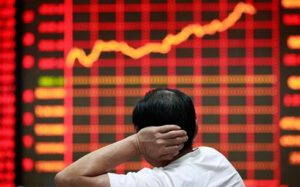
Stock indices of the Asia-Pacific region (APR) rose in trading on Friday, not following the U.S. stock market, which closed lower the day before.
Japan’s Nikkei 225 stock index had gained 0.56 percent by close of trading.
Consumer prices in Japan, excluding fresh food (a key indicator tracked by the country’s central bank), rose 4 percent in December compared with the same month the previous year – the fastest pace since December 1981, according to the country’s Ministry of Internal Affairs and Communications.
The figure exceeded the Bank of Japan’s 2 percent target for the ninth consecutive month. It rose 3.7 percent in November. The consensus forecast of experts quoted by Trading Economics also envisioned an acceleration of growth to 4%.
Overall inflation in Japan last month was also 4% year-on-year, accelerating from 3.8% in November. The rate was the fastest since January 1991.
The leading gainers among indicator components are shares of construction company Taisei Corp. (+4.6%), owner of supermarket chain Isetan Mitsukoshi Holdings Ltd. (+4.2%) and metallurgical company Pacific Metals Co. Ltd. (+4.1%).
SoftBank Group shares slid 0.1%, Tokyo Electron gained 0.2% and Toyota Motor gained 1%.
Hong Kong’s Hang Seng stock index added 1.8% and China’s Shanghai Composite gained 0.8%.
The People’s Bank of China (NBK, the country’s central bank) again kept the benchmark one-year lending rate (LPR) at 3.65% per annum.
The rate for five-year loans remained at 4.3 percent per annum, the NBK said in a statement.
Thus, the NBK did not change them for the fifth month in a row.
Moreover, the NBK continued to inject liquidity into the financial system through open market operations. The Chinese Central Bank lent banks 62 billion yuan in seven-day reverse repo transactions at 2% per annum and 319 billion yuan in fourteen-day transactions at 2.15% per annum.
Oil and gas company CNOOC Ltd. (+5.4%) and Internet companies Meituan (+4.9%) and Baidu Inc. (+4.9%) were the growth leaders in Hong Kong.
Alibaba Group Holding Ltd. gained 3.7% and JD.com Inc. – up 3%.
South Korean indicator KOSPI gained 0.6%.
Producer prices in South Korea rose 6% year on year in December, the lowest since April 2021, official statistical data showed. A month earlier the growth of the indicator was 7.2%.
In monthly terms, the indicator declined by 0.2% (in November – 0.3%).
Stocks of one of the world’s largest chip and electronics maker Samsung Electronics Co. rose 0.5%, the value of automaker Hyundai Motor Co. Ltd. went up 0.3%.
Australia’s S&P/ASX 200 index rose 0.2%.
The capitalization of the world’s largest mining companies BHP and Rio Tinto rose by 0.5% and 1% respectively.
Whitehaven Coal Ltd. shares jumped 6.2%. The company cut coal production by 4% in the second fiscal quarter but increased sales, with prices remaining high.
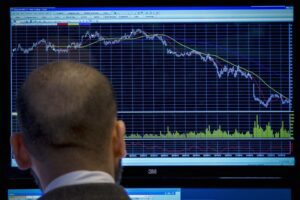
Stock indices of most major Asia-Pacific countries are rising on Friday, the exception is the Japanese market.
Japan’s Nikkei 225 index was down 1.2% by 7:32 am KC.
One of the reasons was the 7.4% drop of Fast Retailing stocks. A day earlier Asia’s largest apparel retailer, which owns the Uniqlo brand, released its September-November reporting, which failed to meet analysts’ expectations.
Fast Retailing increased its revenue in the first quarter by 14%, but it was below the forecasts. At the same time, net income fell 9 percent, mainly due to weak performance in China, where strict quarantine restrictions were in effect.
In addition, shares of automakers Mitsubishi Motors Corp. (-4.3%), Mazda Motor Corp. (-4.2%) and Subaru Corp. (-2.6%) became cheaper on Friday.
Meanwhile, financial sector stocks including Mitsubishi UFJ Financial Group Inc. (+3.5%), Chiba Bank Ltd. (+5.2%), Concordia Financial Group (+6.4%), Fukuoka Financial Group Inc. (+6.4%) rose.
China’s Shanghai Composite was up 0.5 percent by 7:37 a.m. ET, Hong Kong’s Hang Seng gained 0.1 percent.
Shares of game developer Netease Inc. surged 2.9 percent on Hong Kong Stock Exchange, oil producers PetroChina Co. and CNOOC gained 2.9 percent and 1.9 percent, respectively, while Chow Tai Fook Jewellery Group gained 3.1 percent and retailer Alibaba rose 0.6 percent.
China’s foreign trade surplus in 2022 increased by 29.7% to a record $877.6 billion, China’s General Administration of Customs reported on Friday. At the same time, exports increased by 7% and imports increased by 1.1%. The growth rates were lower than in 2021, when they were 29.9% and 30.1%, respectively.
Meanwhile, China’s exports fell 9.9% in December and imports fell 7.5%. The decline in both indicators was recorded for the third month in a row.
The value of South Korea’s Kospi was up 0.85% by 7:32 a.m. ET. The index has been rising for the eighth consecutive trading session and is at its highest level in the past month.
Stocks of one of the world’s biggest chip and electronics makers Samsung Electronics Co. rose 0.7%, automaker Hyundai Motor rose 1.5% and steelmaker Posco gained 4.6%.
Australian S&P/ASX 200 index added 0.7% over the day.
Shares of the world’s largest mining companies BHP and Rio Tinto gained 0.5% and 0.9% respectively.
The value of the country’s leading wine producer Treasury Wine Estates Ltd. rose 2.1%.
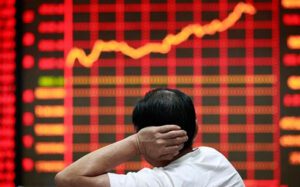
Asia-Pacific (APAC) stock indexes are mostly rising in trading on Friday, except for Hong Kong indicator, following the dynamics of the U.S. stock market.
Japan’s Nikkei 225 stock index was up 0.6 percent by 7:06 a.m. Ksk.
Shares of electronic components producer Taiyo Yuden Co. Ltd. (+4.75%), transport and logistics Kawasaki Kisen Kaisha Ltd. (+4.2%) and Sumitomo Metal Mining Co. Ltd. (+3.7%).
Shares of Mazda Motor Corp. (+3.1%), Tokyo Electron Ltd. (+2.7%) and Sony Group (+2.6%) are also up.
China’s Shanghai Composite stock index was adding 0.1 percent by 7:18 a.m. Ksk.
The Hang Seng index is losing 0.13%. The Hong Kong indicator rose earlier in trading amid reports that China will reopen border crossings with Hong Kong starting Sunday. Border posts have been closed for three years.
The People’s Bank of China (PBOC) on Friday lent 2 billion yuan to banks in seven-day reverse repo transactions at an annual rate of 2 percent. At the same time, similar loans worth 386 billion yuan matured on the same day. As a result, the net outflow of funds from the market amounted to 384 billion yuan, writes Trading Economics.
Leaders of the fall in Hong Kong are securities of casino operator Galaxy Entertainment Group Ltd (-4.4%), Alibaba Health Information Technology Ltd (-4.1%) which provides IT services in medical sphere and sports equipment manufacturer Anta Sports Products Ltd (-3.2%).
South Korea’s KOSPI was strengthening 1.3 percent by 7:18 a.m. Ksk.
One of the world’s biggest chip and electronics maker Samsung Electronics Co. is up 1.4%, carmaker Kia Corp. is up 0.8%.
Australia’s S&P/ASX 200 index rose 0.65%.
The capitalization of the world’s largest mining companies BHP and Rio Tinto rose 3.2% and 2.4%, respectively.
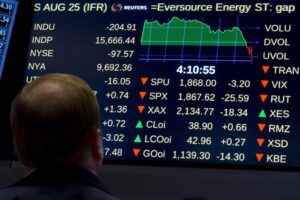
Asia-Pacific stock indices rebounded positively on Monday after the U.S. stock market rallied at the end of last week.
Australian and Hong Kong stock exchanges as well as U.S. and most European countries are closed because of the Christmas holiday.
The Bank of Japan is not going to abandon its ultra-soft monetary policy any time soon, Central Bank Governor Haruhiko Kuroda said.
Last week, the Japanese central bank unexpectedly widened the range within which the yield on ten-year government bonds can fluctuate to plus/minus 0.5% per annum from plus/minus 0.25% previously. Investors took that as a signal that the Bank of Japan was preparing to abandon the ultra-soft monetary policy that it had been pursuing for years.
But Kuroda on Monday rebutted that view, saying that the corridor widening was aimed at boosting the effect of monetary policy and was not the first step in abandoning a major stimulus program. He also noted that the country’s consumer inflation rate could slow below the Bank of Japan’s 2% target in the next fiscal year, which begins in March 2023.
The value of Japan’s Nikkei 225 index rose by 0.65% in trading.
Shares of electronic components maker Sharp Corp. (+3.6%) and commodity companies including JGC Holdings Corp. (+3.5%), Inpex Corp. (+2.5%) and Nippon Steel Corp. (+2.3%) were among the leaders.
In addition, chip maker Advantest Corp. (+1.2%), clothing retailer Fast Retailing (+2%), consumer electronics maker Sony Group (+0.3%), automakers Nissan Motor (+1.9%) and Toyota Motor (+0.3%) went up.
Mitsubishi Electric Corp. and Mitsubishi Heavy Industries Ltd. announced Monday that they intend to merge their generator businesses to become more competitive in the market. The companies plan to sign a definitive agreement at the end of May 2023 and complete the merger of the units by April 1, 2024. Mitsubishi Electric is expected to become the majority shareholder of the new merged company, while Mitsubishi Heavy Industries will become a minority shareholder.
Mitsubishi Electric’s share price rose 1.3 percent and Mitsubishi Heavy Industries rose 2.7 percent.
China’s Shanghai Composite index gained 0.65% over the day.
Technology and consumer companies, including Huizhou China Eagle, up 1.5%; Shenzhen Infinova, Zhejiang Netsun and Xi’an Catering, up about 10%; and automaker BYD, up 4.1%.
The People’s Bank of China on Monday provided banks with 216 billion yuan ($30.9 billion) in reverse repurchase transactions to ensure sufficient liquidity in the financial system at the end of the year. Last week the net inflow of funds into the country’s financial system amounted to 704 billion yuan, the highest weekly infusion since October.
The value of the South Korean Kospi index increased by 0.15%.
Stocks of one of the world’s largest chip and electronics maker Samsung Electronics Co. fell 0.3% and automaker Hyundai Motor rose 0.6%.
A strong rise in quotations showed securities of pharmaceutical companies Kyongbo Pharmaceutical and Samil Pharmaceutical – by 16.3% and 4.5%, respectively.